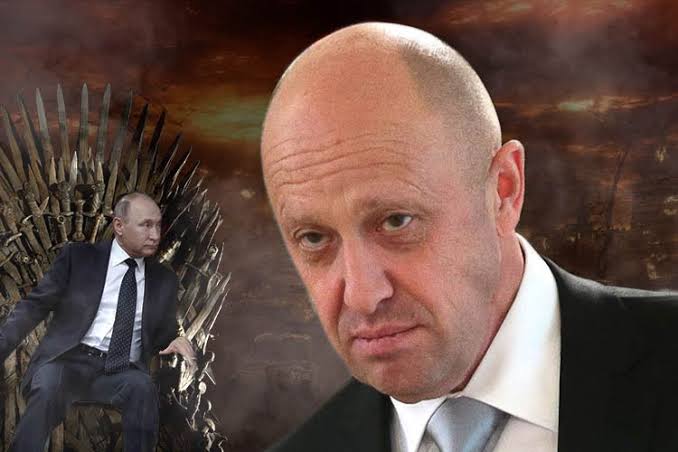Yevgeny Prigozhin, the owner of private military contractor Wagner Group, has marched his mercenary forces into the Russian city of Rostov-on-Don in what many have described as a declaration of civil war on the Russian state.

Prigozhin had vowed to take all necessary steps to topple Russia’s military leadership, hours after the Kremlin accused him of ‘armed rebellion’.
Here’s what is known about the leader of the Wagner Group; Born in 1961 in Russia, Yevgeny Prigozhin is a high-profile, provocative mercenary leader, who has known Russian President Vladimir Putin since the 1990s.
He saw his political star rise in Russia during the Ukraine war.
According to Politico, Mr Prigozhin and Mr Putin share the same hometown, St. Petersburg (then Leningrad).
He received his first criminal conviction in 1979, aged 18, and got a suspended two-and-a-half-year sentence for theft.
Two years later, he was sentenced to 13 years in jail for robbery and theft, nine of which he served behind bars.
Upon his release from jail, Mr Prigozhin set up a chain of stalls selling hot dogs. Within a few years, he was then able to open expensive restaurants in St Petersburg.
It was there that he began mixing with the high and mighty of St Petersburg and then Russia.
The BBC reported that he used that connection to develop a catering business and won lucrative Russian government contracts that earned him the nickname ‘Putin’s chef.’
He later expanded into other areas, including media and an infamous internet ‘troll factory’ that led to his indictment in the US for meddling in the 2016 presidential election.
Earlier this year in January, the 62-year-old acknowledged founding, leading and financing the shadowy private mercenary company Wagner, an organisation that has worked alongside the Russian army during the country’s invasion of Ukraine.
Notably, western countries and United Nations experts have accused Wagner mercenaries of human rights abuses throughout Africa, including in Central African Republic, Libya and Mali.
Prigozhin has been described as a billionaire with a vast fortune built on state contracts, although the extent of his wealth is unknown.
One of the best-known images shows him at the Kremlin in 2011, bending down over a seated Putin and offering him a dish while the Russian leader looks back with an approving glance.
He was sanctioned by Washington which accused him of playing a role in meddling in the 2016 US presidential election, in particular through his internet ‘troll factory’.
Prigozhin at the time denied any involvement and in 2020 asked for US$50 billion in compensation from the United States.
In July 2018, three journalists researching Wagner’s operations in the Central African Republic for an investigative media outlet were killed in an ambush.
While gaining public acclaim in Russia as Wagner spearheaded the capture of several key Ukrainian towns including Bakhmut, Prigozhin has also blasted what he says is systemic mismanagement and lying in the Russian defence ministry.
Prigozhin has been locked in a bitter months-long power struggle with the defence ministry as his ragtag forces spearheaded the costly battles for limited gains in eastern Ukraine.
‘The evil that the military leadership of the country brings must be stopped,’ Prigozhin said on Friday, after claiming the defence ministry had launched strikes on Wagner bases.
Russia’s FSB security service responded by opening a criminal probe into calls to stage ‘an armed mutiny,’ even though Prigozhin has assured Russians he was calling for ‘justice’ and ‘not a coup’.
Before the recent faceoff with Russian officials, Prigozhin toured Russian prisons to recruit Wagner fighters, offering to pardon their crimes if they served a half-month tour on the Ukrainian front lines.
In May, he boasted in an interview that he recruited 50,000 fighters, about 10,000 of which were killed during the grueling and bloody capture of the city of Bakhmut. The city has been Russia’s only major advance since the start of the war.
Nearly half of the 20,000 Russian soldiers killed in Ukraine since December have been Wagner’s troops in Bakhmut.
The US estimates Wagner had about 50,000 personnel fighting in Ukraine, including 10,000 contractors and 40,000 convicts. It is also speculated that Wagner Group is spending about $100 million a month fighting in Ukraine.
With Russian presidential elections coming in 2024, many had speculated that Prigozhin would be Putin’s successor, should the longtime leader choose not to run for reelection.

